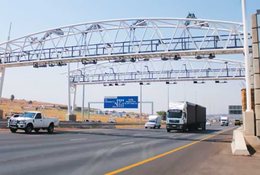They all say no to e-tolling

Government intends launching the controversial Gauteng Freeway Improvement Project e-tolling system ahead of the court review of the decision in November – and the Minister of Transport has urged the public to purchase e-Tags. But there is a thunderous roar of protest in all circles against the concept.
The Opposition to Urban Tolling Alliance (OUTA) filed a replying affidavit on Monday (October 8) and is now more adamant that the decision to toll the Gauteng freeway upgrade was a pitiable one.
OUTA chairperson Wayne Duvenage says an assessment of the numbers and efficiency of e-tolling by OUTA’s expert transport economist shows that the plan suffers from oversights and is a most inefficient method to fund the R17-billion freeway upgrade.
OUTA predicts that the Inter-Ministerial Committee will attempt to woo the public into believing that e-tolling is the best option by further reducing the tariffs and announcing the acceptance of e-tolling by a few entities originally opposed to the plan.
According to Cliff Johnston of the South African National Consumer Union, the cost of collection and the bureaucratic burden it will place on society are independent of the actual amount charged per kilometre.
As the toll rate per kilometre falls, collection costs become an increasingly larger percentage of the amount collected. “This is the ultimate tragedy of the plan,” says Johnson. “The road user will still have to foot the bill of more than R1,1 billion per annum to cover the electronic toll collection process.”
Gary Ronald, head of public affairs at the AA, is concerned about the contracts that are still being kept confidential. It is widely agreed that taxpayers, who are ultimately expected to pay the fees, should be given full view of the entire contract. The veil of secrecy casts serious doubt over the authenticity and accuracy of the few figures related to costs and projected revenues that have been shown to the public.
Duvenage says the “user pay” process and the 8:1 benefit-to-cost ratio for users is a gross exaggeration and has failed to stand up under expert examination.
Adding to the injustice is a lack of the planned upgrading of public transport in Gauteng, which will eventually offer both road users and the general public a reliable, safe and efficient alternative to owning a private vehicle.
Michael Tatalias, CEO of the South African Tourism Services Association (SATSA), says that forcing e-tolling onto the citizens of South Africa is a gross injustice and implies that our intelligence is under-estimated by the authorities – who seem unable to detect when a planned revenue or tax collection system is a waste of one’s hard-earned money and time.
Warnings to government by the Council of South African Trade Unions (COSATU) were expected, and reflect strong unrest at the prospect of a national e-tolling roll-out. All indications are that government should not underestimate the extent of dissatisfaction with the e-tolling plan.
Ari Seiris, CEO of the QuadPara Association of South Africa, continues to show concern for his members who were not consulted during the planning of e-tolling, and are largely unable to use alternative public transport due to its lack of accessibility, convenience and reliability.
OUTA has always said it is willing to pay for the Gauteng freeway upgrade and other national transport infrastructure projects – but not via e-tolling. The alliance is confident that the November judicial review of the decision to implement e-tolling will be a strong challenge against the unjust plan.
Published by
Focus on Transport
focusmagsa


